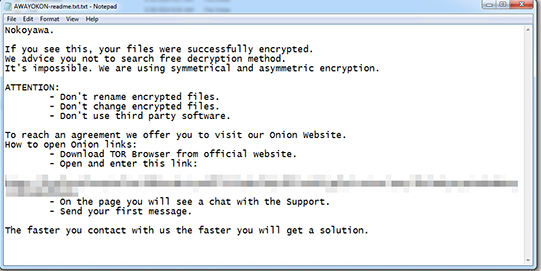Ransom.Win64.NOKO.YPCJNT
Windows


Threat Type: Ransomware
Destructiveness: No
Encrypted:
In the wild: Yes
OVERVIEW
This Ransomware arrives on a system as a file dropped by other malware or as a file downloaded unknowingly by users when visiting malicious sites.
It avoids encrypting files with the following file extensions.
TECHNICAL DETAILS
Arrival Details
This Ransomware arrives on a system as a file dropped by other malware or as a file downloaded unknowingly by users when visiting malicious sites.
Other Details
This Ransomware does the following:
- The following can be changed in the runtime configuration:
- Directories to avoid
- File extensions to avoid
- Ransom note content
- Ransom note filename
- Appended extension of encrypted files
- The following can be enabled/disabled in the runtime configuration:
- Encryption of network shares
- Delete shadow copies
- Loading of hidden drives
It accepts the following parameters:
- --file {File Path}→ encrypt selected files
- --dir {Directory Path}→ encrypt selected directories and sub-directories
- --config {Base64 encoded config} → runtime configuration of the sample.
Ransomware Routine
This Ransomware avoids encrypting files found in the following folders:
- windows
- program files
- program files (x86)
- appdata
- programdata
- system volume information
It appends the following extension to the file name of the encrypted files:
- .AWAYOKON
It leaves text files that serve as ransom notes containing the following text:
- {Encrypted Directory}\AWAYOKON-readme.txt

It avoids encrypting files with the following file extensions:
- .exe
- .dll
- .ini
- .lnk
- .url
SOLUTION
Step 1
Before doing any scans, Windows 7, Windows 8, Windows 8.1, and Windows 10 users must disable System Restore to allow full scanning of their computers.
Step 2
Note that not all files, folders, and registry keys and entries are installed on your computer during this malware's/spyware's/grayware's execution. This may be due to incomplete installation or other operating system conditions. If you do not find the same files/folders/registry information, please proceed to the next step.
Step 3
Search and delete these files
- {Encrypted Directory}\AWAYOKON-readme.txt
Step 4
Scan your computer with your Trend Micro product to delete files detected as Ransom.Win64.NOKO.YPCJNT. If the detected files have already been cleaned, deleted, or quarantined by your Trend Micro product, no further step is required. You may opt to simply delete the quarantined files. Please check the following Trend Micro Support pages for more information:
Step 5
Restore encrypted files from backup.
Did this description help? Tell us how we did.

